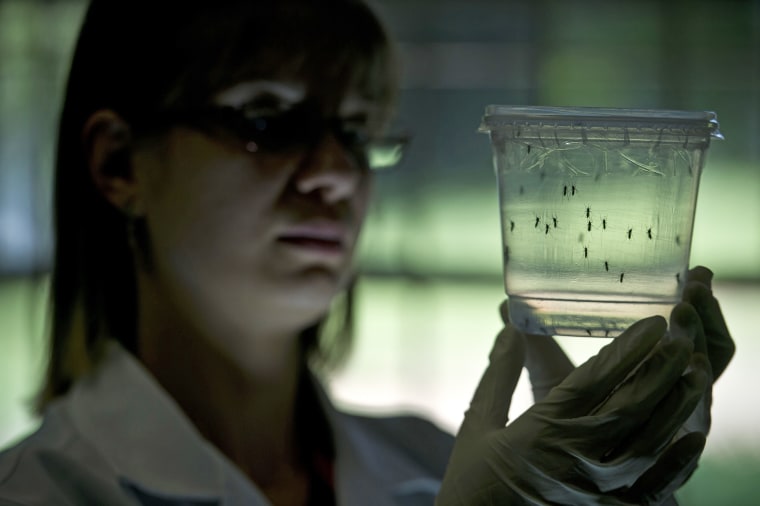Tests of donated blood confirm what health experts have feared: Zika virus is spreading fast in Puerto Rico, and that means hundreds of babies could be born with birth defects.
More than 1 percent of all Puerto Rico blood donations tested in early June tested positive for Zika virus, the Centers for Disease Control and Prevention said Friday.

Based on what the CDC knows about blood donors and how screening reflects the spread of disease, that translates into as much as 2 percent of the population having been infected that week.
“In coming months, it is possible that thousands of pregnant women in Puerto Rico will catch Zika,” CDC director Dr. Thomas Frieden said at a briefing for reporters.
Related: Puerto Rico has First Zika Birth Defect
"This could lead to dozens or hundreds of infants being born with microcephaly in the coming year."
The CDC started screening donated blood for Zika in April in Puerto Rico, the U.S. territory that’s hardest hit by Zika. Any donations that test positive for the virus are thrown out.
“In coming months, it is possible that thousands of pregnant women in Puerto Rico will catch Zika.”
While blood donors don’t necessarily reflect the whole population, the CDC knows that it’s possible to extrapolate how an infection has spread by looking at blood donations. And Puerto Rico has already had a perfect practice run for Zika: the chikungunya virus, a very close relative of Zika that is spread by the same Aedes aegypti mosquitos, came to Puerto Rico in 201.
“With chikungunya, about a quarter of the population became infected in less than a year,” Frieden said.
Related: U.S. Records First Zika Death, in Puerto Rico
A look at Zika in the blood supply shows a steady increase every week, the CDC found.
“During April 3–June 11, 2016, a total of 68 (0.5 percent) presumptive viremic donors were identified from 12,777 donations tested, a team led by CDC’s Matthew Kuehnert reported.
“The highest weekly incidence was 1.1 percent for the latest week of reporting, June 5–June 11, and incidence has been increasing over time.”
Frieden says that can add up to 2 percent of the total population having been infected in that month.
"This means over the course of many months, i,e a nine-month pregnancy, there is a substantial chance a woman would become infected," Frieden said.
"This could lead to dozens or hundreds of infants being born with microcephaly in the coming year."
The CDC said Thursday that six babies in the U.S. had Zika-related birth defects and three of them had miscarried or been aborted. CDC knows of 234 pregnancies affected by Zika in the 50 states and another 189 in U.S. territories.
All the mainland Zika cases so far have been travel-related, but CDC says there will be local outbreaks once mosquitoes start really biting. The mosquitoes that can carry Zika are found in 40 states, and someone infected with Zika could be bitten and infect a mosquito, which could then spread it to other people.
Related: Brazilian Researchers Find Evidence Zika's Getting Worse
Health officials in Puerto Rico are also testing people directly for Zika and have confirmed more than 1,700 Zika infections this year so far. That would translate into far more actual infections, since only a fraction of people infected with Zika show symptoms and only a few of these would go to a doctor and get tested.
They also confirmed 113 cases of dengue and 75 of chikungunya, so those viruses, both relatives of Zika, are also circulating.
Zika is known to cause a range of serious birth defects including the horrific microcephaly, caused by brain damage that results in a smaller-than-normal head. It causes other types of brain damage, damage to eyes and possibly other organs, and can cause miscarriages and still births.
It can also cause complications such as Guillain-Barre syndrome, a rare, paralyzing disorder caused by a number of infections. But the biggest risk is to unborn babies.
“It is important to emphasize that the priority with Zika is to protect pregnant women,” Frieden said.
Although we know we cannot make the risk zero, we know we can reduce it some,” he added. “We don’t want, a few months from now when babies are being born with birth defects, that we will say we wish we had done more.”

